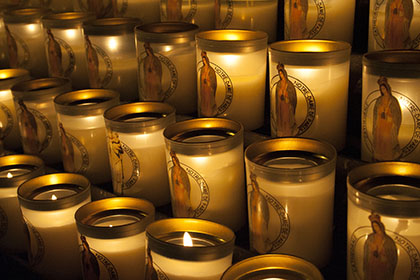Every August, my family gets together for a reunion of sorts: we call it a Feast (capital F) and it’s hosted by my grandfather’s Italian society out in a private park. In many ways, it is a typical family gathering—tons (too much, really) of food, lots of yelling, lots of cousins; you know how it goes. The only difference is that our Feast involves a mass and then, in the afternoon, each family in the society takes turns carrying a large statue of the Virgin Mary around the park. No, we’re not a cult—we’re just old-school Roman Catholics.
The custom of a feast like this actually comes from early Italian immigration to America. Seeking a way to stay connected, friends and relatives from the same small area all formed societies to celebrate their hometown’s patron saint. In many ways, my grandfather’s Italian society is the same today as it was back when it was first formed—that is to say, only men can join. Like the Roman Catholic Church itself, the whole setup reeks of sexism. And while I was raised with the church being a part of my life, the great irony is that I am a Hillary Clinton-loving, Riot Grrrl-ing, unabashedly liberal feminist.
But I don’t actually see being a liberal, feminist Roman Catholic as really that uncommon. For starters, I certainly wasn’t raised to see myself/women as being subservient. Though this mentality is certainly held by some members of older generations, I was always taught differently. My family has been pretty key to my feminism in this respect—my grandfather was always the first to classify members of his society as “grumpy old men, soon to be left behind in the times,” while my grandmother is basically Dorothy Zbornak reincarnated. This is on top of the glaringly obviously fact that the whole society worships a woman, along with countless other examples of badass Roman Catholic saints and nuns: St. Catherine, Joan of Arc, Mother Teresa, Sister Simone Campbell and the Nuns on the Bus, just to name a few.
In mixing religion and politics, I fall in line with the 60% of American Catholics that don’t attend Church regularly, the 77% who believe that abortion should be legal, and the 59% that believe in marriage equality. (All statistics taken from the March 2014 report by the Pew Research Center’s Religion & Public Life Project). These numbers line up fairly neatly with the Democratic platform and fall in line with longer trends that show moderate Catholics voting more liberally, despite the Vatican’s stalwart stance on a majority of (really, all) issues.
In all, 71% of American Catholics believe that the election of Pope Francis represents a major change in the direction of the church. While I remain somewhat skeptical, I certainly will credit His Holiness’ PR skills—just inspiring people to believe again (especially after the disaster of Pope Benedict) is a major feat. More importantly, however, is that I’ve never really considered my political opinions to be in contradiction with anything I learned in religion class. After all, the Ten Commandments are supposedly about the values of social justice. I choose to think of them more as guidelines: as my homeslice (and fellow Catholic) Diablo Cody described her opinion, “it’s about finding your own spiritual path and drowning out human judgment.”

Photo by Andy Sutterfield